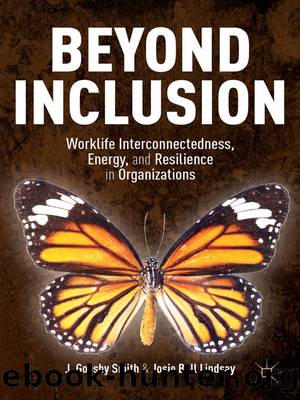Beyond Inclusion by J. Goosby Smith & Josie Bell Lindsay

Author:J. Goosby Smith & Josie Bell Lindsay
Language: eng
Format: epub
ISBN: 9781137385437
Publisher: Palgrave Macmillan
Published: 2014-08-14T16:00:00+00:00
CHAPTER 9
FAIRNESS AND TRUST
Women work harder for the same pay.
—Big Bank Executive on “fairness”
I’ll wait and see if the program actually occurs
—Big Bank Manager on “trust”
This chapter is different from other chapters because it presents two dimensions of Ubuntic inclusion: Fairness and Trust. Though distinct, to the thousands of employees with whom we interacted in these organizations, fairness and trust were so highly correlated that sometimes respondents discussed them concurrently.
Fairness and trust are ingredients of Ubuntu. In societies operating within such a paradigm, it is expected that people will be treated equitably, thus resulting in fairness. Since this assumption of fairness is rampant, the level of interpersonal and societal trust is high. For example, for South Africa’s (post-Apartheid) Truth and Reconciliation process to work, both parties, Blacks and Whites, had to believe on a grand scale that they would be treated fairly—even the Whites who had subjected the Blacks to Apartheid had to believe this. One of the reasons that this process was effective was that the assumption of equity led to mutual trust—which to Americans’ and other nations’ eyes seemed wholly implausible. We mention this historical event because organizations practicing Ubuntic inclusion are capable of accomplishing the impossible when they stay true to the principle of Ubuntu.
Our respondents’ references to fairness and trust often aligned with various aspects of organizational design models.1 Some of the elements in these design models are organizational strategies, values, cultures, human resources, processes, relationships, compensation systems, job designs, and formal and informal structures. Along with faith and trust in each other, in leaders, in norms, and in treatment, this chapter addresses aspects of fairness and trust that were most salient for the employees who spoke to us.
More specifically, in this chapter we address seven dimensions of fairness and six dimensions of trust. First, we address seven dimensions of fairness: Fair and legal staffing or recruiting processes, Fair professional development practices, Fair compensation, Fair promotion practices, Fair policies and norms, Fair treatment, and Fair work-life balance. We then present the six dimensions of trust that we heard from respondents: Trust in the organization’s strategy, Trust in Human Resources, Trust in organizational processes, Trust in organizational leaders, Being trusted by leaders, and Trust in one’s colleagues.
Download
This site does not store any files on its server. We only index and link to content provided by other sites. Please contact the content providers to delete copyright contents if any and email us, we'll remove relevant links or contents immediately.
| Anthropology | Archaeology |
| Philosophy | Politics & Government |
| Social Sciences | Sociology |
| Women's Studies |
Cecilia; Or, Memoirs of an Heiress — Volume 1 by Fanny Burney(32558)
The Great Music City by Andrea Baker(32018)
Cecilia; Or, Memoirs of an Heiress — Volume 2 by Fanny Burney(31956)
Cecilia; Or, Memoirs of an Heiress — Volume 3 by Fanny Burney(31941)
We're Going to Need More Wine by Gabrielle Union(19046)
All the Missing Girls by Megan Miranda(16027)
Pimp by Iceberg Slim(14506)
For the Love of Europe by Rick Steves(14121)
Bombshells: Glamour Girls of a Lifetime by Sullivan Steve(14075)
Talking to Strangers by Malcolm Gladwell(13370)
Norse Mythology by Gaiman Neil(13363)
Fifty Shades Freed by E L James(13240)
Mindhunter: Inside the FBI's Elite Serial Crime Unit by John E. Douglas & Mark Olshaker(9342)
Crazy Rich Asians by Kevin Kwan(9292)
The Lost Art of Listening by Michael P. Nichols(7506)
Enlightenment Now: The Case for Reason, Science, Humanism, and Progress by Steven Pinker(7313)
The Four Agreements by Don Miguel Ruiz(6765)
Bad Blood by John Carreyrou(6621)
Weapons of Math Destruction by Cathy O'Neil(6279)
